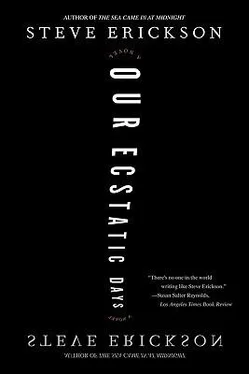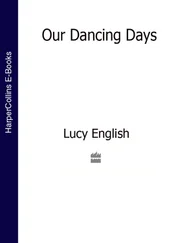“What do you mean?”
“I mean we go back into old references to try to find some sort of entry, old travel books, old hotel guides, we go back into the city archives and pull out old geological surveys, zoning ordinances … and find no record of a hotel here at all.” He stops and gazes around them. “Look at this. This wasn’t a truck stop. This wasn’t a motel on some back road to nowhere. There are plenty of records of another hotel about half a mile southwest of here, but not this.”
“Maybe this is that other hotel. Maybe the records aren’t exact.”
He shakes his head, “We found that other one. It never went all the way under and actually was pretty famous, the Chateau Something with rock musicians and movie stars back in the last century, and then in the ’10s and ’20s some sort of religious-mystic fortune-telling bondage … uh … hey,” he shrugs when he sees the way she’s looking at him, “it was L.A., even if it was under water. But this,” he sighs, sweeping his arm at the floor beneath them, “was just the middle of a road leading into an old canyon that led to a valley beyond that. Records show homes, a neighborhood, a corner gas station … no hotel though, and nothing like this.”
“What’s the other thing?” Angie says. They come into what appears to have been a huge ballroom, or several ballrooms
or have I really gotten turned around at all? and now I feel my first real panic,
conjoined; a few patches of wall still have shards of old mirror, and from the ceiling sway the stems of chandeliers plucked by the lake long ago. “The other thing?” says the project director.
“You said there are a couple of things that make this site interesting.”
“The other thing,” he answers, “is that … what our records do show is that … well, this was it.”
“This was what?”
“This was where it came from.”
“This was where what came from?”
“The lake.”
“The lake?”
“Yes.”
“The lake came from here?”
“Yes.”
“The lake came out of this hotel.”
“Well of course we don’t have any official indication there was a hotel.”
“Well there was, obviously, officially or not.”
that I’ve gotten turned around, that maybe I’m returning up up and up to the
The director takes a deep breath. “I can’t explain the hotel,” he says, “but the whole reason for digging here in the first place was a pretty formidable amount of evidence, ranging from the anecdotal to the geological, that the source of the lake was somewhere right under here. Look,” he takes another deep breath, “I don’t know … and the stories surrounding all this you wouldn’t believe….” They cross the plundered ballrooms into two small transitional rooms that appear to provide the only passage to the rest of the building. In one stands the remnants of what may have been a large pillar; if there was such a pillar in the other, it’s gone now. Out of these rooms Angie and the director exit into the hotel’s mezzanine, once obviously spectacular and lavish. Now the music, still high and vague, is close; once again, at the sight of Angie the workers stop. There’s a buzz in the mezzanine as they turn from their work.
By itself, in the middle of the mezzanine that dwarfs it, under lights that have been set up around it, stands a rough wooden table, with high legs and a small surface-top; the table has been roped off. On top is a closed metal box.
“That’s where we first found it,” the director says, “crawling across the floor where the table is now.”
“Do you know where it came from?” the woman says looking around the mezzanine.
“Not really,” he answers, pointing, “we assume one of these suites.”
“I would like to take a look there first, if it’s all right,” she says, “before the box.” She follows the director through one suite then
wrong lake, to the version of the lake I came from, and I almost turn back
the other. They wander among the strewn beds and loveseats in a rounded blue chamber beneath a light fixture that’s managed to survive all the water and years; another suite is circled by doors, a couple still with their original mirrors. “We looked through all those,” the director nods at them, “there are passages running to some of the other rooms and we went through those too.” Angie walks over to the wall. Running her fingers along its side, she presses her ear to it, listening; the director peers around at the workers watching.
They go back out into the mezzanine that’s filled with sound. “All right,” Angie says, nodding at the box. All the workers watching back up against the surrounding walls. The director moves the rope that cordons off the table while Angie pulls from her case some gloves and two long-handled stainless steel forceps, one large and one smaller. Everything has so long led to this moment that now, for her own reasons, Angie realizes she’s afraid of it too, like the rest of them; she’s about to ask either the driver or project director to open the box but decides it’s something she should do herself, as though her hands aren’t shaking and her heart isn’t thundering in her chest. The workers circling the edge of the mezzanine shrink back even though there really isn’t anywhere else to back into; some flee the room. Although the music is much louder now and — as she reaches the large forceps into the box and picks up the glowing snake — grows louder still, it isn’t cacophonous exactly. It’s hardly a din. Some of the time it even exists at a level barely anyone can hear, spiraling into itself, devouring first its own tail and then the rest of itself, at the place where terror becomes beauty before it becomes terror again.
It writhes brilliantly at the end of the forceps. Then suddenly the
downward, but I go on up up and up rising like the bubble of him that rose in
snake’s body sizzles into nothing, and in its place is a vapor, leaving only the snake’s head in the forceps’ grip.
By now most of the excavation workers have fled the mezzanine, along with Angie’s driver. The project director is stricken, fixed to where he stands. Almost spellbound herself, gripped by an ecstasy she’s felt before but can’t identify, Angie tells herself she must work quickly should the snakehead vanish too; with the smaller forceps she invades the snake’s mouth and then, when the tool proves useless, throws the forceps to the floor and sticks her fingers in the snake’s open mouth roughly pulling the helix from its throat. An answer? she wonders, the Question? holding it up before her, one moment a black bubble the next moment collapsed light, neither reducible nor mutable by chaos or god
this is the loss of one’s child
and then in the blink of an eye it’s gone as well. Completely alone in the mezzanine now, the director having unfixed himself and run, Angie spins in her place before rushing into the first suite turning one ear then the other to the walls, then rushing into the next suite and then the third, listening to the walls of each. She runs back into the mezzanine and slides herself along the walls listening with one ear then the other until she stops, cocks her head, and then turns her gaze to the mezzanine’s far end, and a single small pantry door. She crosses the length of the mezzanine. Reaching the small closed door, she places her fingers to it, putting her ear to it and immediately pulling back. She presses her ear to it again and,
my dream that night I miscarried him, up up and up rising to break the surface
opening the door, can practically feel the oxygen leave the room; leaning into the small dark pantry, it seems like minutes before she can see in the black gorge beneath her, far inside the birth canal of the century; the small boy in the water, both unknown to her and more familiar than she can stand, flailing and grasping for someone’s hand, a mother’s that’s too far from him or, perhaps, a man’s with a glint of glass in it — except there is no man there. The boy descends. Angie feels rise behind her the nullifying tide of a life never lived.
Читать дальше











